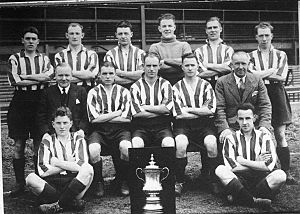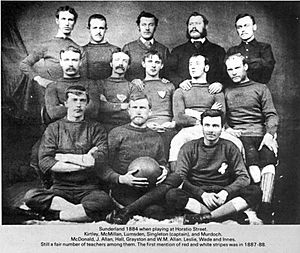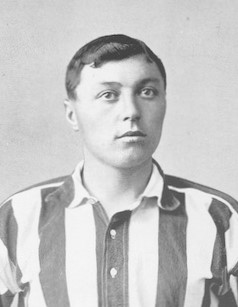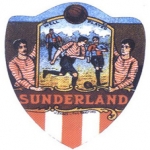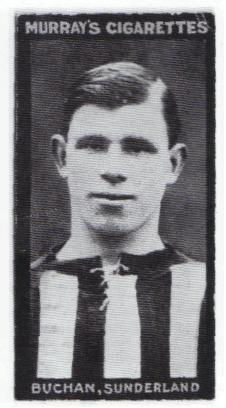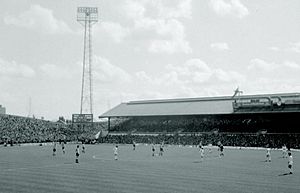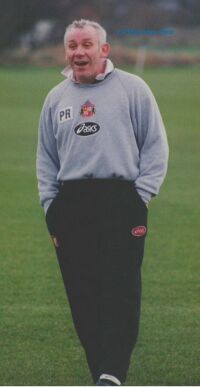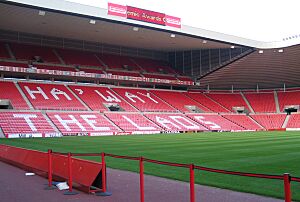History of Sunderland A.F.C. facts for kids
Sunderland Association Football Club, often called Sunderland A.F.C., is an English football club. They are based in Sunderland, Tyne and Wear. The club started in 1879.
Sunderland played in the FA Cup and local games for many years. They joined the Football League in the 1890–91 season. They played in England's top league until 1957–58. Sunderland has won the English League championship six times. These wins were in 1892, 1893, 1895, 1902, 1913, and 1936. They have also finished second five times.
The club has won the FA Cup twice. They won in 1937 against Preston North End. They won again in 1973 against Leeds United. Sunderland also reached the FA Cup final in 1913 and 1992. They were runners-up in the League Cup final in 1985 and 2014. Other wins include two Charity Shields, in 1902 and 1935.
Contents
- How Sunderland A.F.C. Started: 1879–1913
- More Titles and Moving to Roker Park: 1896–1913
- World Wars and Between the Wars: 1913–1939
- Second World War and Post-War Years: 1939–1959
- FA Cup Glory and Europe: 1959–1979
- Two Cup Finals: 1979–1997
- New Stadium: 1997–2008
- Recent Years: 2008–Present
- Images for kids
- See also
How Sunderland A.F.C. Started: 1879–1913
Sunderland AFC began as "Sunderland & District Teachers Association Football Club." It was started in 1879 by James Allan. He was a teacher who wanted to create a fun activity for other teachers. Their first game was on November 13, 1880, which they lost 1–0.
Their first uniform was all blue. This is different from their famous red and white stripes today. Their first home ground was Blue House Field. They moved grounds four times before settling at Newcastle Road in 1886.
In October 1880, the club changed its name to Sunderland Association Football Club. People who were not teachers could now join. The club became professional in 1885. They also signed their first international players from Scotland that year. James Allan, the founder, left in 1888. He did not like how professional the club was becoming.
Tom Watson became Sunderland's first manager in 1888. In 1890, William McGregor, who started the Football League, called Sunderland "the team of all talents." He said they had "a talented man in every position."
Early League Success and "Champions of the World"
Sunderland played in local games and the FA Cup. They also played friendly matches against Football League clubs. They even beat the League champions Preston North End in 1889. As they became more popular, they asked to join the Football League. Sunderland offered to help pay for other clubs' travel costs. This helped them get a spot in the League.
In their second season in the Football League (1891–92), Sunderland won the title. They were five points ahead of Preston North End. They won their second League title the next season (1892–93). They were 11 points ahead of the second-place team. That season, they also had a big 8–1 win over West Bromwich Albion.
They almost won three titles in a row in 1893–94. They finished second to Aston Villa. Sunderland won their third League title in four seasons in 1894–95. After this, they played a game against Heart of Midlothian, the champions of Scotland. This game on April 27, 1895, was called the "Championship of the World title match." Sunderland won 5–3 and were named "Champions of the World."
A rich supporter named Samuel Tyzack helped fund the "team of all talents." He would often pretend to be a priest to find players in Scotland. Sunderland's team in the 1895 World Championship was made up entirely of Scottish players.
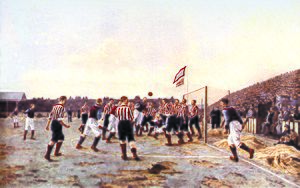
Johnny Campbell was the top scorer in the league during Sunderland's first three title wins. Other important attackers were Jimmy Hannah and Jimmy Millar. Goalkeeper Ned Doig set a record. He did not let in any goals in 87 of his 290 top division games.
More Titles and Moving to Roker Park: 1896–1913
After winning three League titles, manager Tom Watson left Sunderland in 1896. Robert Campbell took over. From 1886 to 1898, Sunderland played at Newcastle Road. In 1898, the club moved to Roker Park. This would be their home for almost 100 years. Roker Park could hold 30,000 fans at first. Over time, it grew to hold over 75,000 people.
Campbell did not win any titles in his three seasons as manager. He left in 1898–99. Alex Mackie became the new manager. He led Sunderland to their fourth League title in the 1901–02 season. They also won the Sheriff of London Charity Shield, beating Corinthians 3–0.
In 1904, Sunderland had a problem with club finances. The Football Association (FA) investigated. They found that the club had made some payments that broke League rules. As a result, Sunderland was fined £250. Six club directors were suspended for two and a half years.
After 214 matches, Mackie left the club because of this issue. Bob Kyle became the new manager. In 1905, Sunderland was part of the first £1,000 player transfer. This was when Alf Common moved to Middlesbrough. In 1907–08, Sunderland had their biggest League win. They beat Newcastle United 9–1 at St James' Park.
Kyle won his only League championship with Sunderland in the 1912–13 season. They won the League with 54 points. On April 19, 1913, Sunderland almost won both the League and the FA Cup. But they lost 1–0 to Aston Villa in the FA Cup Final. During this time, Charlie Buchan was a great goal scorer. He scored 221 goals for Sunderland, making him the club's second-highest goal scorer.
World Wars and Between the Wars: 1913–1939
Sunderland finished eighth in the 1914–15 season. Then, World War I stopped the football league. Many players went to fight. Charlie Buchan and Bob Young both won the Military Medal. After the war, the League started again. Sunderland finished fifth in the 1919–20 season.
To stay strong in the First Division, Sunderland bought several expensive players. They paid a world record fee of £5,500 for Warney Cresswell in 1922. In the 1922–23 season, they almost won another League title. They finished second to Liverpool.
In April 1925, Sunderland signed Dave Halliday. He scored 38 goals in his second season. This helped Sunderland finish third in the League. In the 1928–29 season, Halliday scored 43 goals. This is a club record for most goals in one season. Bob Kyle, who had been manager since 1905, left in 1929. He had managed 817 matches.
Johnny Cochrane became the new manager. Sunderland reached the FA Cup semi-final in 1930–31. They lost to Birmingham City. Sunderland finished second to Arsenal in 1934–35. The next season, Sunderland won their sixth League title. They scored 109 goals that season. Raich Carter and Bobby Gurney each scored 31 goals.
A Sad Loss and FA Cup Win
Despite winning the league, the season had a sad event. The team's young goalkeeper, Jimmy Thorpe, died. He was kicked in the head and chest during a game. This led to a new rule. Players were no longer allowed to raise their foot to a goalkeeper who had the ball.
After winning the League, Sunderland played in the Charity Shield. They beat FA Cup-winners Arsenal. Their success continued in the 1936–37 season. They won their first FA Cup. They beat Preston North End 3–1 in the final at Wembley Stadium. Bobby Gurney, Raich Carter, and Eddie Burbanks scored the goals.
Sunderland played in the Charity Shield again. They lost 2–0 to Manchester City. In 1937–38, they reached the FA Cup semi-finals. But they lost 3–1 to Huddersfield Town. Cochrane retired from management in 1939. He had been in charge for 11 seasons. He led them to a League title and an FA Cup win.
Second World War and Post-War Years: 1939–1959
Bill Murray became Sunderland's manager in 1939. But World War II started, and the League competition was stopped. The FA Cup was also stopped. A new tournament, the Football League War Cup, was created. Sunderland reached the War Cup final in 1941–42. They lost to Wolverhampton Wanderers.
During the war, Roker Park was damaged by bombs. A police officer was killed there. After the war, the FA Cup started again in 1945–46. Sunderland reached the fifth round. The League started again the next season. Sunderland finished ninth. In 1947–48, the club finished twentieth. They were almost relegated from Division One for the first time.
In January 1949, Sunderland bought Ivor Broadis for £18,000. He was a player-manager for Carlisle United. He handled his own transfer talks. In 1948–49, Sunderland lost to non-League club Yeovil Town in the FA Cup. But the next season was better. They finished third in the League and scored the most goals (83). Dickie Davis was their top scorer with 25 goals.
In 1950–51, Sunderland paid a world record transfer fee. They signed Welsh striker Trevor Ford for £30,000. At this time, Sunderland was known as the "Bank of England club." This was because they spent a lot of money on new players.
Financial Issues and Relegation
In January 1957, the FA received a letter. It said Sunderland was making illegal payments to players. The FA investigated. They found evidence of illegal payments. For example, a £3,000 bill was supposedly for straw to cover the pitch. The investigators found other similar issues. Companies would charge Sunderland too much money. Then they would send credit notes to balance it out. These notes were given to players.
In total, over £5,000 was handled this way. The club's chairman and chief financial officer were suspended forever. Three other directors were also suspended. Sunderland was fined £5,000. Manager Murray was fined £200. Some players, including Trevor Ford, were suspended from playing for a while. After this, manager Bill Murray was replaced by Alan Brown.
In 1958, under Alan Brown, Sunderland was relegated from Division One. This was the first time in their history. It ended their 68-year stay in England's top division. They lost their final game to Portsmouth. Leicester City also won their game, which meant Sunderland was relegated.
FA Cup Glory and Europe: 1959–1979
After being relegated in 1957–58, Sunderland struggled in Division Two. They finished sixteenth in 1959–60. They finished third twice in 1961–62 and 1962–63. They just missed out on promotion. The 1961–62 season also saw Brian Clough retire due to injury. He had scored 63 goals in 74 games. After six years in Division Two, Sunderland was promoted back to the First Division in 1963–64.
Alan Brown left Sunderland in 1964. George Hardwick took over temporarily. Then Ian McColl became the permanent manager. Brown returned for a second time in 1968. After their promotion, Sunderland did not do well in Division One. They were relegated for the second time. Billy Elliott took over briefly. Then Bob Stokoe became the permanent manager.
In 1967, Sunderland played in North America. They were called the Vancouver Royal Canadians. They finished fifth in the league's Western Division.
1973 FA Cup Win
In 1973, Sunderland was a Second Division team. But they reached the FA Cup Final. They beat the cup-holders Leeds United. Ian Porterfield scored the only goal in the first half. Goalkeeper Jimmy Montgomery made an amazing double save. He stopped a header and then a shot from Leeds. This prevented Leeds from scoring.
After the game, manager Stokoe ran onto the pitch to hug his goalkeeper. A statue of this moment now stands outside the Stadium of Light. Only two other clubs have won the FA Cup while playing outside the top league. These were Southampton in 1976 and West Ham United in 1980.
The FA Cup win meant Sunderland qualified for a European competition for the first time. This was the UEFA Cup Winners' Cup. They beat Hungarian team Vasas Budapest 3–0. In the next round, they played Sporting Lisbon. Sunderland won the first game 2–1 at Roker Park. But they lost 2–0 in Lisbon and were knocked out.
In 1976, Sunderland was promoted to the First Division again. They won the Division Two championship. Stokoe became ill in 1976–77 and stepped down. Ian MacFarlane took over temporarily. Then Jimmy Adamson became manager. After being promoted, Sunderland was relegated back to the Second Division. Adamson managed for two seasons before leaving. David Merrington and then Billy Elliot managed the team briefly.
Two Cup Finals: 1979–1997
Sunderland celebrated 100 years in the 1979–80 season. They played a special match against an "England XI." They lost 2–0. In 1979, Ken Knighton became manager. He led them to second place in Division Two in his first season. This meant promotion to the First Division. However, he was fired the next season when Sunderland was struggling. Mick Docherty took over temporarily and helped them avoid relegation.
Alan Durban became manager in 1981. He was fired in 1983–84 after a loss to Manchester United. Former player Pop Robson managed one game. Then Len Ashurst became the regular manager. In 1984–85, Ashurst led Sunderland to their first League Cup final. They lost 1–0 to Norwich. Sunderland was relegated back to the Second Division at the end of the season. Ashurst was fired.
Lawrie McMenemy became manager in 1985. But Sunderland reached their lowest point in 1987. They were relegated to the Third Division. This happened after losing a play-off to Gillingham. It was the first time they had ever been in the Third Division. However, under new manager Denis Smith, they were promoted right away. Sunderland returned to the Second Division as Third Division champions in 1988.
Two years later, Sunderland reached the Second Division play-off final. They beat Newcastle United in the semi-final. In the final, Sunderland lost 1–0 to Swindon Town. However, Sunderland was promoted a few weeks later instead of Swindon. This was because Swindon had financial problems.
After only one season, Sunderland was relegated again. They struggled in Division Two in 1991–92. But that season, Sunderland made it to the FA Cup final. They lost 2–0 to Liverpool. Smith had left as manager during the season. His assistant Malcolm Crosby took over. He resigned less than a year later. Former England player Terry Butcher replaced him.
Butcher's time as manager ended in 1993. Mick Buxton replaced him. In a period with many managers, Buxton was fired in 1995. Sunderland's board asked Peter Reid to be temporary manager. He helped them avoid relegation quickly. Reid was given a permanent contract. Reid's first full season (1995–96) was very successful. The club won the Division One title. They were promoted to the Premier League for the first time. In 1996–97, they were relegated despite beating big teams like Manchester United.
In 1998, a TV show called Premier Passions was broadcast. It showed Sunderland A.F.C. during the 1996–97 season. This was when the club was relegated from the Premier League. It also showed their move to the Stadium of Light.
New Stadium: 1997–2008
In the 1996–97 season, Sunderland moved to the Stadium of Light. This new stadium had 42,000 seats. It was built at Monkwearmouth. They had been at Roker Park for 99 years. Fans had mixed feelings about the move. A play called "I Left My Heart at Roker Park" was created about a fan who missed Roker Park.
The stadium's capacity was later made bigger to 49,000 seats. This made it the fourth largest club stadium in England. A Davy Lamp stands outside the stadium. This is to remember the important mining history in the area.
In their first full season at the new stadium (1997–98), Sunderland finished third in Division One. They reached the play-off final at Wembley. Over 40,000 fans traveled to see the game against Charlton Athletic. The match was a 4–4 draw after extra time. But Charlton won on a penalty shootout.
In the 1998–99 season, Sunderland won the Division One title. They earned a record 105 League points. They secured promotion by winning 5–2 at Bury. Kevin Phillips won the European Golden Shoe in his first top-flight season. He scored 30 goals.
In September 2001, the SAFC Foundation was created. This separated Sunderland's charity work from the club. It later became known as the Foundation of Light.
In 2001–02, Sunderland barely avoided relegation. They were the lowest-scoring team in the Premier League. They finished seventeenth. In 2002–03, they finished last in the Premier League. They had only 4 wins, 21 goals, and 19 points. This was a record low at the time. Manager Peter Reid was fired in October. Howard Wilkinson took over, but he left after six months. Mick McCarthy became manager in March 2003. But he could not stop them from being relegated.
In 2003–04, Sunderland finished third in Division One. They lost in a penalty shootout to Crystal Palace. This stopped them from reaching the play-off final. In 2004–05, Sunderland finished first in the League. This meant they returned to the Premier League. The 2005–06 season was bad for Sunderland. They did not win a home game before Christmas. They were relegated with a new record low of 15 points. McCarthy was fired in March. Kevin Ball took over temporarily. He led Sunderland to their first home win of the season.
On August 6, 2007, Sunderland celebrated 10 years at the Stadium of Light. They played a friendly match against Juventus. They spent almost £40 million on new players for the team. They also paid £9 million for goalkeeper Craig Gordon. This was a British transfer record for a goalkeeper. Sunderland stayed in the Premier League for the 2008–09 season. This was after a derby win over Middlesbrough. On October 25, 2008, Sunderland beat rivals Newcastle United 2–1 at the Stadium of Light. This was their first home win against them since 1980.
On December 4, 2008, manager Roy Keane left Sunderland after many losses. Coach Ricky Sbragia took over temporarily. On December 27, 2008, Sbragia became the permanent manager. The team still struggled. They barely avoided relegation on the last day of the season. Sbragia then resigned.
Recent Years: 2008–Present
Irish-American businessman Ellis Short took full control of the club. Steve Bruce was announced as the new manager on June 3, 2008.
Jordan Henderson was named Sunderland's Young Player of the Year twice. At the end of the 2010–11 season, he moved to Liverpool F.C.. He later became captain there and won the Champions League.
Sunderland had a tough start to the 2012–13 season. Their first win was not until late September. Manager Martin O'Neill was fired on March 30. Paolo Di Canio was announced as his replacement. This caused some controversy because of Di Canio's past statements. David Miliband, a club Vice Chairman, resigned because of this. The Durham Miners' Association also protested. They threatened to remove a mining banner from the Stadium of Light.
In his first season, Paolo Di Canio helped Sunderland stay in the Premier League. But the 2013–14 season was not as good. Di Canio was fired after only one point in five league games. On October 8, 2013, Gus Poyet became manager.
Poyet had a difficult start. But he managed to keep Sunderland in the Premier League. This happened in the second to last game of the season. He also led Sunderland to the League Cup Final that season. They beat Manchester United in a penalty shootout in the semi-finals. These achievements earned Poyet a new two-year contract.
The next season was less successful for Gus Poyet. Sunderland was just above the bottom three. The club fired Poyet on March 16, 2015. Sam Allardyce replaced Poyet. He guided them to a 17th-place finish. They won 3–0 against Everton at home. This meant Newcastle was relegated.
Sam Allardyce then became the manager for the England national team. David Moyes replaced him at Sunderland.
Sunderland finished 20th in the Premier League in 2016–17. They were relegated to the Championship under David Moyes. In June 2017, goalkeeper Jordan Pickford was transferred to Everton for £25 million. He had joined Sunderland's academy when he was eight years old.
Sunderland finished 24th in the Championship in 2017–18. They were relegated again, this time to EFL League One. This was their second relegation in a row. The events of this season were shown in the documentary series Sunderland 'Til I Die on Netflix. Sunderland had four managers that season. David Moyes resigned. Simon Grayson replaced him. Then Chris Coleman took over.
In April 2018, a group led by Stewart Donald bought the team. Ellis Short sold the club after the second relegation. Stewart Donald became the official owner of Sunderland on May 21.
St Mirren manager Jack Ross was appointed manager in May 2018. This was for the club's second-ever season in the third tier of English football. In their first season in League One, the team finished 5th. They reached the play-off final but lost to Charlton Athletic at Wembley.
Images for kids
See also
- Scotch Professors
 | Roy Wilkins |
 | John Lewis |
 | Linda Carol Brown |


